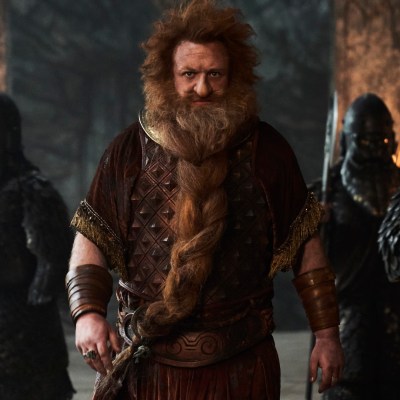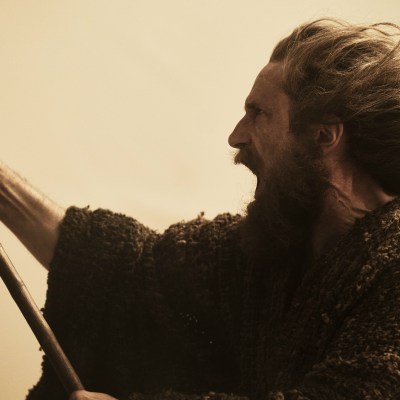This review contains spoilers for The Lord of the Rings: The Rings of Power season 2 episode 7.
This is it. The big battle episode of The Lord of the Rings: The Rings of Power season 2 is upon us, in the now-traditional position of penultimate episode (thanks to Game of Thrones).
The opening scenes of this episode are tonally very different to the rest, but the contrast is very effective. For a handful of scenes through the first half, Celebrimbor (Charles Edwards) is in a different story altogether: part horror, as he briefly sees himself as he really looks in the mirror, and part time loop episode, a grand tradition of sci-fi/fantasy television that is a really fun inclusion here. The drastic jump from the vision of peace Sauron (Charlie Vickers) has created for Celebrimbor to the reality that is Eregion under siege and on fire is also a great bit of visual storytelling and brings home the horror of the war vividly. Celebrimbor breaking the spell by literally breaking the window is also rather cathartic, at the same time as utterly tragic.
Sauron has gone full obvious villain here, telling people “I will see to it that you are duly rewarded” and “It will be a sad occasion, I’ve so enjoyed our time together.” He might as well be telling them frankly “I’m going to kill you, by the way.” But the Elves are too much under his spell whether literally (Celebrimbor) or metaphorically (Mirdania) to notice. R.I.P. Mirdania – a character who was perfectly well-acted by Amelia Kenworthy, but also honestly quite annoying, so we didn’t massively mourn Sauron pushing her off a rampart.
Poor Celebrimbor’s realization that Annatar is Sauron has been a long time coming, but something about staging it as he stands, covered in Sauron’s blood having realized it has been poured into the Nine Rings for Men, seems right. It also continues a thread we noticed a couple of episodes ago, of explaining why the different sets of Rings seem to have such different effects on their bearers. The show connects this to their making (rather than to the species of the bearer) which is probably an improvement, and Sauron pouring his blood into the Nine provides a creepily effective explanation for the extreme transformation of the Ringwraiths who eventually wear them.
Celebrimbor ends up back in horror-territory when he has to remove his own thumb to escape, which is a strange sort of nod to Frodo’s eventual loss of a finger to the One Ring. But at least we finally see Sauron slightly on the back foot, as he “deceives even himself,” which offers some slight hope to a pretty hopeless episode.
The action of the battle is well-written and rendered. Damming the river as a battle tactic is rather fun, a neat inversion of the real-life Dambusters mission carried out by the British RAF in World War II, as well as a sinister echo of Elrond (in the books) or Arwen (in the movies) raising the river to sweep away the Ringwraiths in The Fellowship of the Ring. Like season 1’s “Udûn,” this episode cuts between action at the battle and quieter moments featuring other characters. But the inter-cutting is done more effectively here than it was previously, because all of the quieter moments are directly related to the battle, and each ramps up the tension even more.
No episode is perfect, and there are moments here that give us pause. For Tolkien fans, top of that list is Elrond (Robert Aramayo) snogging Galadriel (Morfydd Clark), who is his mother-in-law. Ick. We will choose to assume that this was a clever ruse to enable him to sneak her a tool to help her escape, and leave it be at that. (The show has not made any reference to Galadriel’s daughter Celebrían yet, and Galadriel thinks her husband Celeborn is dead. But we know he is not, and even if the series has moved Celebrían’s birth to a later date, in order for Arwen and her brothers to exist, Celebrían and Elrond have to get married, which will make this moment retrospectively awkward).
Elrond and Galadriel also continue to make somewhat dubious military decisions, particularly when Elrond stops a military charge upon seeing Galadriel in a cage. This moment reduces Galadriel to damsel in distress and makes us seriously question Elrond’s skills as a military commander. Elrond’s story is salvaged, though, by the cleverly developed story between him and Durin (Owain Arthur). We’ve missed seeing these two old friends together this season and it was a joy to see them share the screen again. That joy turns to epic tragedy when we see Durin faced with an impossible choice, and Elrond left abandoned on the battlefield, repeating almost like a prayer, “Durin will come. Durin will come.”
It is a moment of utter heartbreak, the exact inverse of Tolkien’s favorite trope in a battle scene (giant Eagles or the Rohirrim coming to the rescue when all seems lost). The way it is written and filmed almost exactly like the climactic entrance of Gandalf and Éomer at sunrise during the Battle of Helm’s Deep in The Two Towers only makes the appearance of a single messenger and the news that Durin is not coming all the more painful, topped off by a great performance from Robert Aramayo, Elrond’s pain and confusion written all over his face.
Elsewhere, the rather ass-kicking death of Expendable Elf (a.k.a. Selina Lo’s Rían ) would have been more effective if we had seen more of her; she was in episodes 4 and 5 of this season, but did not get up to anything especially memorable. It is still a pretty cool moment and another realization of a common Tolkien theme. Elrond telling her, “a single arrow from you may yet turn the tide,” and then exactly that happening, is a bit on the nose but certainly fits the themes and tropes of other Tolkien stories.
One of the things this season has done much more effectively than season 1 is to incorporate themes and ideas into the story that feel like something Tolkien would have approved of. Tolkien’s biggest concern with potential adaptations of his work was that they would not stick to the morals expressed in his books, whether or not they compressed (or in this case, expanded) the story. Season 1 of The Rings of Power fell foul of that guideline once or twice, most egregiously in the Harfoots’ horrifying practice of abandoning to death any member of their company who developed so much as a slight limp.
Season 2 has gone a long way to correcting that (and not just because only two of the Harfoots are in it). Celebrimbor tells Galadriel that, “it is not strength that overcomes darkness, but light,” which is much more in line with Tolkien’s worldview as presented in his books. Thousands of years later, Galadriel herself will become symbolic of that light, giving Frodo the literal light of Eärendil to take with him into Mordor.
The episode ends on a very effective cliffhanger, with Adar (Sam Hazeldine) taking possession of Nenya and Arondir (Ismael Cruz-Córdova) clearly very badly injured if not dead (this is TV, so we never assume anyone is dead until we see the body). The Orc song over the credits somewhat undercuts the epic tragedy of the episode, but that has not put us off from looking forward to next week’s finale.
This may not be a perfect episode – nothing is – but it is The Rings of Power’s first five-star episode as far as we’re concerned. Epic, exciting, and tragic, just like all the best battle episodes should be.
Learn more about Den of Geek’s review process and why you can trust our recommendations here.
The post The Rings of Power Season 2 Episode 7 Review: The Battle of Eregion Comes to Life appeared first on Den of Geek.




0 Commentaires